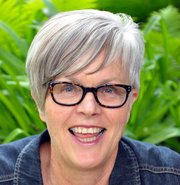Joanne Levy nominated me to do the Writing Process Blog Tour, and I said yes right away. Joanne is someone I’m always happy to see, and her blog posts always make me laugh. Oh, and if I could afford to hire a virtual assistant, it would be her. 
I met Joanne back in 2012 through #Torkidlit, a group of Toronto area writers of middle grade and young adult books. When I heard the title of her then forthcoming first novel, Small Medium at Large, I knew I liked her sense of humour and wanted to read her book. I bought two copies at her launch and gave one to my favourite Grade 5 girl, and wasn’t surprised that we both loved it. Small Medium at Large is quirky, funny, and much praised. It was nominated for the 2014 Ontario Library Association’s Forest of Reading in the Red Maple category (grades 7 & 8), was chosen as a 2013 Sydney Taylor Notable Book, and is a nominee for the 2014 Manitoba Young Readers’ Choice Awards and the 2015 Louisiana Young Readers’ Choice Awards.
You’ll definitely want to check out Small Medium at Large, and read about Joanne’s writing process in her post. 
The Writing Process Blog Tour is a weekly blog post where authors answer four supplied questions about their writing process, then nominate another author to do it the following week. It’s been going on for several years now. Here are my answers to the four questions:
1. What are you working on?
At the moment I’m revising a historical YA novel I started seven years ago. Lots of writers have a book they say took them ten years to write, and this is going to be mine. I started with a snippet of family history, but without a clear idea of what the story was and how to write historical fiction, and got lost in the process of figuring that out. Putting the ms. away for a few years has given me insight into what’s not working, and I hope I’ll soon have it ready to submit.
2. How does your work differ from others of its genre?
This is such a hard question. When I thought about it I was overcome with dread. Maybe because it would feel like bragging if I could think of something, or maybe because I know I should work harder at making my work fresh and original. So I’ll just avoid the issue and say that I write in a different genres – YA novels and short stories, tween novels, adult short stories, women’s fiction (writing as Elizabeth Sage), and I’ve even published children’s poetry.
3. Why do you write what you do?
I prefer reading contemporary fiction, both YA and adult, so that’s what I write. I like to feature strong female protagonists, probably because I grew up at a time when many doors were closed to girls and women. Four of my early books were published by a small literary feminist press, and Stabenfeldt has published several of my books in many languages for their GIRL:IT bookclubs. But I’m interested in issues facing boys and men too, and don’t want to exclude them, so sometimes write from a male point of view. There’s Liam in my most recent YA novel, How to Tend a Grave, and Darcy in my anthologized short story, “Holding Harley”. I’m always trying to grow as I writer though, so plan to attempt an adult psychological thriller in the future.
4. How does your writing process work?
I used to get an idea and then just start writing. The first draft was all about finding the story, and then I’d have to do about nineteen drafts to make the book work. But I’ve recently changed my approach, and now plan the story first. I work out the hook, inciting incident, major plot points and character motivation before I start writing. The weeks or months when I’m doing this are misery, because it’s mostly thinking and making a lot of timelines and charts and handwritten notes. It’s frustrating because I feel like I’m getting nowhere and just wasting writing time. But the payoff is that once I figure things out, the writing goes very quickly, with way fewer drafts, and although the story can still develop and grow organically, there are no major structural changes. I’m pretty sure I’ll stick with this method, as for me it’s resulted in producing a better book faster.
I don’t worry about writing every day no matter what – that just doesn’t work for me. And I don’t worry about reaching a daily word count either. I do what I can, and sometimes that’s three chapters and sometimes more like three paragraphs. I don’t edit much until I’ve got a first draft finished, which means letting go of trying to make it perfect and just getting it done. Then I let the ms. rest awhile before editing and revising.
Okay, enough about me.
 I’ve nominated Karen Krossing to do the Writing Process Blog Tour next week. I got to know Karen when we chose her story “Profanity” for Cleavage: Breakaway Fiction for Real Girls, a YA anthology I co-edited. A talented, dedicated writer whose engaging work receives starred reviews and many award nominations, Karen is Past President of CANSCAIP, the Canadian Association of Children’s Authors, Illustrators and Performers. She’s also a freelance copywriter and editor and runs workshops for emerging writers. She has written many books for kids and teens, my favourites being The Yo-Yo Prophet and her latest, Bog.
I’ve nominated Karen Krossing to do the Writing Process Blog Tour next week. I got to know Karen when we chose her story “Profanity” for Cleavage: Breakaway Fiction for Real Girls, a YA anthology I co-edited. A talented, dedicated writer whose engaging work receives starred reviews and many award nominations, Karen is Past President of CANSCAIP, the Canadian Association of Children’s Authors, Illustrators and Performers. She’s also a freelance copywriter and editor and runs workshops for emerging writers. She has written many books for kids and teens, my favourites being The Yo-Yo Prophet and her latest, Bog.
Watch for Karen’s answers to the writing process questions on her blog on Thursday, October 2. And read her books, too!
Thanks so much to Joanne for nominating me, and I’m looking forward to Karen’s post next week.
Meanwhile, what’s your writing process? Please feel free to comment below.


Thanks for the lovely words about me, Jocelyn! This is a very insightful post and I love that you admit to not writing every day. So many people say you MUST write each and every day, but that doesn’t work for me (nor my schedule) either. I write when I can, too, and sometimes that does mean pulling off a few cobwebs, but that’s okay. It all comes back eventually.
Looking forward to Karen’s post, too! Loving this tour. 🙂
You’re welcome,Joanne. Interesting about the “must write everyday” thing. I think what it really means is that you have to take your writing seriously.
You need to commit to the work, and make it a priority. But for me, there are days when other things, like family, come first – and that’s okay. I’m also a big believer in the unconscious, and often find the days when I don’t write are productive in other ways – new ideas and insights.
Exactly. Even when I’m not writing, I’m ALWAYS writing. I suspect that’s true for most writers.
Yes, everything feeds the writing. Nothing is wasted, even though it can sometimes feel that way.
My novel BOG was a ten-year book, Jocelyn. I suppose some books just take longer to cook. During the writing of almost every story, I’m always wondering whether it will hold together and work in the end. It’s so hard to know during the thick of it.
Thanks for the peek into your writing process. I enjoyed reading your post and Joanne’s! And thanks for nominating me. I’m looking forward to it.